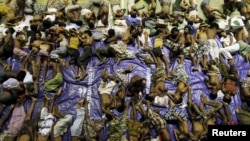Indonesian authorities have intercepted another boat full of migrants and refugees from Myanmar, as Southeast Asian officials continue to struggle to deal with thousands of Rohingya Muslims apparently abandoned at sea by people smugglers.
Indonesia's navy stopped the boat late Monday off the coast of north Aceh and provided food, water and medical supplies to those on board before sending them on their way, said a navy spokesman. The spokesman said the migrants were not trying to land in Indonesia. Their desired destination is not clear.
Over 2,000 Rohingya refugees from Myanmar and Bangladeshi migrants have been rescued at sea over the past several days, and activists and officials warn thousands more could be trapped in crowded boats. The crisis is believed to be tied to Thailand's recent crackdown on human trafficking.
Last week, the Thai prime minister ordered a clean-up of suspected traffickers' camps after the bodies of several dozen people, believed to be from Myanmar and Bangladesh, were found in shallow graves in the country's south. Dozens have been arrested in connection with the camps, including local officials and police officers.
Activists had warned the crackdown could result in a separate humanitarian crisis in which thousands of Rohingya were stuck on overcrowded ships or abandoned by their smugglers. Early this week, that prediction began to come true.
Police in Malaysia say smugglers dumped more than 1,000 Rohingya in shallow waters off the island of Langkawi late Sunday night. Officials say many appeared weak and hungry.
Indonesian authorities also say they intercepted a boat off the northwestern coast of Aceh Monday morning, a day after two boats carrying some 500 people landed there.
The mostly Muslim Rohingya are denied citizenship and other basic rights in Myanmar and have been the victims of a wave of violence by extremist Buddhist mobs in recent years.
Myanmar, a majority Buddhist country, does not recognize the existence of the Rohingya ethnicity. Government officials, and many locals, instead view Rohingya as illegal migrants from Bangladesh and refer to them as "Bengalis."
Sectarian unrest killed up to 280 people and displaced 140,000 others in June 2012. Since then, tens of thousands of Rohingya have been forced to stay in filthy, overcrowded, prison-like camps in western Rakhine state.
The U.N. General Assembly late last year passed a resolution urging the group to be granted full citizenship, equal rights, freedom of movement, and allowed to self-identify as Rohingya.
U.N. Secretary-General Ban Ki-moon urged the government of Myanmar to address the citizenship status of Rohingya Muslims ahead of elections planned for later this year.
Ban told regional officials at a meeting on Myanmar last month at the United Nations that the ongoing communal tensions in the country's western Rakhine state could be "seriously destabilizing."
"There are already troubling signs of ethnic and religious differences being exploited in the run-up to the elections," and said the reform process could be jeopardized if the underlying causes of tensions are not addressed,” he said.
The Myanmar government has rejected the demands for citizenship, but has expressed a willingness to consider citizenship for those who will identify as Bengali.
Burma's 1982 citizenship law says members of any officially recognized minority must be able to prove their ancestors lived in Burma before the British invaded Rakhine in 1823.
The British occupation of Rakhine prompted a large migration of Muslims into the area from neighboring Chittagong, then part of British-ruled India and now in modern-day Bangladesh.
Most of Burma's hundreds of thousands of Rohingya Muslims say their ancestors have lived in Burma for generations. But the impoverished minority group lacks the documentation to prove it.












